|
Music Reviews
Alternative
Blues
Books
Christmas
Classic Rock
Country
Jazz
Lounge
Oldies
Power Pop
Punk & New Wave
Reggae
Rhythm & Blues
Seventies
Texas
Special Features
Randy's Rodeo
Sex Pistols
Motown
Halloween
Valentine's Day
Information
About Me
Feedback
Links
User's Guide
Support Me
Amazon
iTunes
Sheet Music Plus
|
Sock it to me, Santa! Visit my other website, www.hipchristmas.com Visit my other website, www.hipchristmas.com
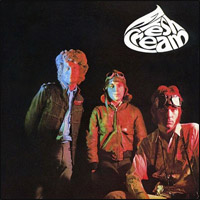 Generational
issues come into play with Cream.
I know musicians about ten years older than me who get the same reverential, palpitating
response when listening to 60's Cream records that I get from 70's Television albums.
It's a matter of perspective, for Cream's sort of virtuosity was valued as highly in
their time as the guitar interplay of Richard Lloyd and Tom Verlaine was in their's.
To my ears, Cream went a little overboard at times - seventeen-minute drum solos, for
crissakes - but they produced an admirable, prolific body of work (four studio and
three live LP's, plus non-LP singles) in scarcely two years. And, Cream carved an impressive
series of milestones in rock history, being both the first supergroup and the first
power trio. More importantly, however, Cream was the first true blues-rock group. More
than merely a rock group who played the blues, Cream fused the two genres into a distinct
new sound. Generational
issues come into play with Cream.
I know musicians about ten years older than me who get the same reverential, palpitating
response when listening to 60's Cream records that I get from 70's Television albums.
It's a matter of perspective, for Cream's sort of virtuosity was valued as highly in
their time as the guitar interplay of Richard Lloyd and Tom Verlaine was in their's.
To my ears, Cream went a little overboard at times - seventeen-minute drum solos, for
crissakes - but they produced an admirable, prolific body of work (four studio and
three live LP's, plus non-LP singles) in scarcely two years. And, Cream carved an impressive
series of milestones in rock history, being both the first supergroup and the first
power trio. More importantly, however, Cream was the first true blues-rock group. More
than merely a rock group who played the blues, Cream fused the two genres into a distinct
new sound.
They accomplished that by achieving what few supergroups ever did: Cream was more
than the sum of its parts. Three topnotch English players - Eric Clapton (guitar),
Ginger Baker (drums), Jack Bruce (bass and primary vocalist) - joined forces in Cream
to create music more adventurous than any they had attempted before. Ginger Baker (who
had a traditional jazz background) and Jack Bruce had played together in both the Graham
Bond Organisation and the Alexis Korner's Blues Incorporated, and Clapton played briefly
with Bruce in John Mayall's Bluesbreakers. Clapton and Bruce also collaborated in the
Powerhouse with Stevie Winwood (then with Spencer Davis) and Paul Jones shortly before
Bruce briefly joined Jones' group, Manfred Mann.
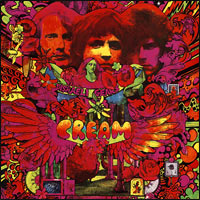 All
together, an impressive resume - but super? Not really. Truth be told, Cream was considered
a supergroup only in England, where blues revivalists like Alexis Korner and John Mayall
were - and still are - venerated. Of Cream's three founders, however, only Clapton
had earned any notoriety in the United States, where he was already being praised as "god" by
guitar buffs thanks to his incendiary work with the Yardbirds. Even so, Clapton had
quit the Yardbirds before they commenced their string of American hits with "For
Your Love," the song that prompted Clapton's exodus due to its overtly pop nature.
Clapton, you see, was thought to be a blues purist. All of which makes the case that
the startling innovation of Cream's music - which was a far cry from pure blues - and
the magnitude of their success could not have been anticipated, supergroup or not. All
together, an impressive resume - but super? Not really. Truth be told, Cream was considered
a supergroup only in England, where blues revivalists like Alexis Korner and John Mayall
were - and still are - venerated. Of Cream's three founders, however, only Clapton
had earned any notoriety in the United States, where he was already being praised as "god" by
guitar buffs thanks to his incendiary work with the Yardbirds. Even so, Clapton had
quit the Yardbirds before they commenced their string of American hits with "For
Your Love," the song that prompted Clapton's exodus due to its overtly pop nature.
Clapton, you see, was thought to be a blues purist. All of which makes the case that
the startling innovation of Cream's music - which was a far cry from pure blues - and
the magnitude of their success could not have been anticipated, supergroup or not.
Cream's 1966 debut single, "Wrapping Paper," did little to foretell what
was to come. The follow-up, "I Feel Free," was better, a trippy, propulsive
pop song that provided a showcase both Bruce's robust voice and Clapton's concise,
stinging guitar. Later that year, however, the band's first LP, Fresh
Cream, finally showed the breadth of the group's talent and ambition. Mixing daring
originals ("Sweet Wine," "N.S.U.") with blues standards (Skip James' "I'm
So Glad," Willie Dixon's "Spoonful"), Fresh
Cream established a formula - if we can call it that - for the rest of Cream's
brief career: combining traditional and modern elements into an organic whole, on songs
both new and old.
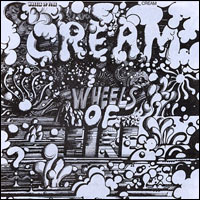 Disraeli
Gears (1967) stuck to that formula, with improved results; if not Cream's finest
album, it is certainly their first fully-realized effort. All but two songs on Disraeli
Gears were original compositions (all three band members wrote, often in collaboration
with producer Felix Pappalardi or lyricist Pete Brown), songs bracing both in the
creativity of their composition and passion of the performances. Songs like "Strange
Brew" and "Tales Of Brave Ulysees" are unlike anything in the annals
of rock, sounding somehow brand new and ageless at the same time. It's worth noting,
too, that Disraeli
Gears is a launching point for British heavy metal; Cream's overamped blues would
echo loudly across Led Zeppelin's debut album two years hence. At any rate, Cream's
heroic efforts were rewarded with commercial success, as both Disraeli
Gears and one of its singles, the proto-metal smash "Sunshine Of Your Love," attained
Top 5 status. Disraeli
Gears (1967) stuck to that formula, with improved results; if not Cream's finest
album, it is certainly their first fully-realized effort. All but two songs on Disraeli
Gears were original compositions (all three band members wrote, often in collaboration
with producer Felix Pappalardi or lyricist Pete Brown), songs bracing both in the
creativity of their composition and passion of the performances. Songs like "Strange
Brew" and "Tales Of Brave Ulysees" are unlike anything in the annals
of rock, sounding somehow brand new and ageless at the same time. It's worth noting,
too, that Disraeli
Gears is a launching point for British heavy metal; Cream's overamped blues would
echo loudly across Led Zeppelin's debut album two years hence. At any rate, Cream's
heroic efforts were rewarded with commercial success, as both Disraeli
Gears and one of its singles, the proto-metal smash "Sunshine Of Your Love," attained
Top 5 status.
Cream followed Disraeli
Gears with a mildly successful single, Eric Clapton's "Anyone For Tennis" (featured
in the movie The Savage Seven), that, in retrospect, foreshadowed
the soft-spoken style the guitarist would adopt as a solo artist. The band's next
album, however, was anything but understated. Wheels
Of Fire (1968) consisted of two records - one studio, one live - that spoke to
the both the ambition and the burgeoning egos of Cream's three components. As for
ambition, the album spent four weeks atop the American charts and introduced another
batch of of impressive songs, including "White Room," "Politician," a
stalwart rendition of Albert King's "Born Under A Bad Sign" (written by
Booker T. Jones and William Bell), and Eric Clapton's definitive interpretation of
Robert Johnson's "Crossroads."
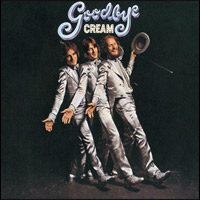 As
for ego, well, this is where the aforementioned age differential becomes apparent.
Simply releasing a double-album in 1968 took a lot of gumption, and Wheels
Of Fire's second LP - the live one - was comprised of just four songs, two of them
exceeding fifteen minutes (including "Toad," Baker's epic drum solo). Listeners
old enough to have listened to Wheels
Of Fire when it was first released no doubt heard a masterpiece - this is amazing
stuff, especially for its day. More to the point, for listeners lucky enough to have
actually witnessed Cream on stage, Wheels
Of Fire allowed them to re-experience three skilled improvisational musicians weaving
gold from mere threads of pop - by all accounts, it was magical. But, let's be honest,
most of us weren't there (or even born yet), and that kind of magic doesn't translate
well to vinyl. Nevertheless, Wheels
Of Fire and Cream's other concert albums - Live
Cream (1970) and Live
Cream Vol. 2 (1972) - remain among their most popular records. As
for ego, well, this is where the aforementioned age differential becomes apparent.
Simply releasing a double-album in 1968 took a lot of gumption, and Wheels
Of Fire's second LP - the live one - was comprised of just four songs, two of them
exceeding fifteen minutes (including "Toad," Baker's epic drum solo). Listeners
old enough to have listened to Wheels
Of Fire when it was first released no doubt heard a masterpiece - this is amazing
stuff, especially for its day. More to the point, for listeners lucky enough to have
actually witnessed Cream on stage, Wheels
Of Fire allowed them to re-experience three skilled improvisational musicians weaving
gold from mere threads of pop - by all accounts, it was magical. But, let's be honest,
most of us weren't there (or even born yet), and that kind of magic doesn't translate
well to vinyl. Nevertheless, Wheels
Of Fire and Cream's other concert albums - Live
Cream (1970) and Live
Cream Vol. 2 (1972) - remain among their most popular records.
Meanwhile, the egos of Clapton, Bruce, and Baker were growing huge, indeed, and Cream
began splintering even as Wheels
Of Fire was hitting the racks. One final tour and it was over, though a fourth
LP, Goodbye
Cream (1969) was pieced together from studio leftovers (most notably "Badge," Clapton's
collaboration with Beatle George Harrison) and live cuts. Jack
Bruce immediately commenced a solo career, while Eric
Clapton and Ginger
Baker worked together in another supergroup, Blind
Faith (read more), before striking out on their own. Bruce
and Baker have led relatively acclaimed solo careers, but Clapton has inarguably eclipsed
them both, becoming one of the most popular, respected rock musicians ever (read
more).
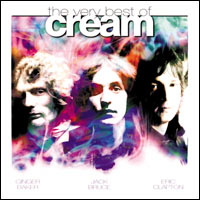 Despite
the obvious power of their albums - endless jams notwithstanding - Cream's singles
hold together very well on their own, and their record label (originally Atco, now
Universal) began releasing compilation albums almost as soon as the group broke up.
These include Best of Cream (1969) and Heavy
Cream (two LP's, 1972) - both never reissued on CD - and Strange
Brew: The Very Best Of Cream (1983). The latter album has been roundly eclipsed
by the similarly-titled The
Very Best Of Cream (1995, pictured), easily the best Cream anthology ever issued
- 20 songs encompassing every single Cream released, including a couple not on LP.
More dedicated fans, however, should simply purchase Those
Were The Days (1997), Cream's 4-CD boxed set featuring every official studio track,
a selection of live tracks, and several choice rarities - instant Cream, if you will.
Also of note: BBC
Sessions (2003), a revelatory compilation of radio broadcasts. Despite
the obvious power of their albums - endless jams notwithstanding - Cream's singles
hold together very well on their own, and their record label (originally Atco, now
Universal) began releasing compilation albums almost as soon as the group broke up.
These include Best of Cream (1969) and Heavy
Cream (two LP's, 1972) - both never reissued on CD - and Strange
Brew: The Very Best Of Cream (1983). The latter album has been roundly eclipsed
by the similarly-titled The
Very Best Of Cream (1995, pictured), easily the best Cream anthology ever issued
- 20 songs encompassing every single Cream released, including a couple not on LP.
More dedicated fans, however, should simply purchase Those
Were The Days (1997), Cream's 4-CD boxed set featuring every official studio track,
a selection of live tracks, and several choice rarities - instant Cream, if you will.
Also of note: BBC
Sessions (2003), a revelatory compilation of radio broadcasts.
Beyond their actual recordings, Cream had a tremendous impact on the world of rock
- not all of it good. While all three members - Baker, Bruce, and Eric Clapton - were
virtuosos, Cream's emphasis on virtuosity set the stage for greater and greater excesses
through the years. Particularly in the moribund realm of heavy metal - but also blues,
country, and jazz - the quantity and speed of notes played began to exceed the wisdom
with which those notes were chosen. But, we can't really blame Cream for this - or
for any other excesses that arose from their popularity. Cream's long flights of fancy
- depending on one's age or perspective - could be brilliant or boring, but much of
Cream's music is truly timeless.
|
|